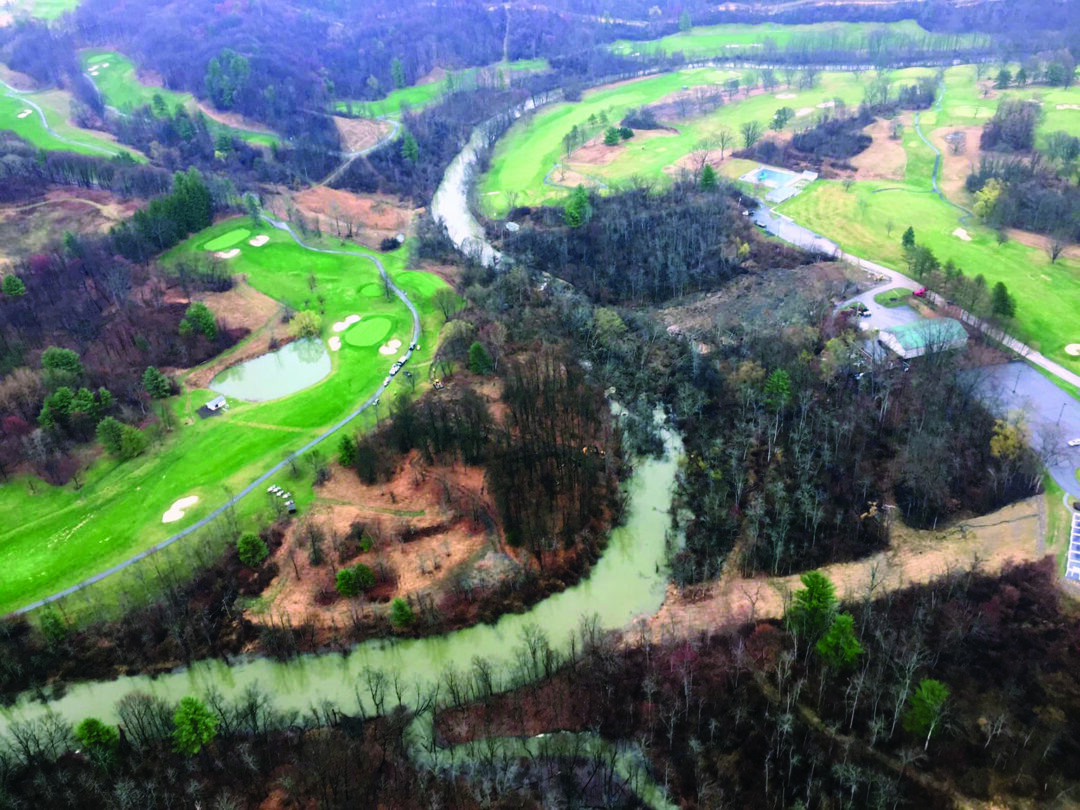BETHLEHEM — The City of Albany plans to sue the Town of Bethlehem and Normanside Country Club to recoup costs accrued after last year’s landslide.
Albany Mayor Kathy Sheehan vowed Wednesday, April 20, that the city plans to seek “full reimbursement” of costs accrued during the April 21, 2015 landslide at Normanside Country Club.
The town and Normanside each continue to deny any wrongdoing in the event, as the town claims that the country club was dumping fill beyond what they were approved to and before they were approved to do so, while Normanside claims the town should never approved the fill to be placed on the slope in the first place.
Bethlehem is included in the lawsuit from the City of Albany because the town did approve Normanside’s construction work, and the lawsuit will seek to decide, once and for all, where the blame lies.
In their lawsuit, the City of Albany will seek reparations for costs accrued during initial emergency repairs. The landslide caused the county executive to call for a state-of-emergency as county crews worked to create an emergency channel through nearly 200 yards of debris and mud between Normanside and the city-owned Capital Hills golf course, which lies down-river from Normanside.
There is no official number yet from the city on how much was spent on those emergency repairs, but costs were likely in the hundreds of thousands of dollars. Costs come from renting five giant pumps to force the creek downstream, cutting the emergency channel, and hauling at least three truckloads of pipe in from Connecticut to direct the water past the blockage.
Local municipalities, mostly the City of Albany and Bethlehem, paid an estimated $190,000 for initial emergency repairs, with Bethlehem paying $80,000 of that.
The town has applied for state aid to reimburse the costs, which officials are hopeful to receive, but funds may also be made available as a result of litigation, said Bethlehem Town Supervisor John Clarkson. “It should also be understood that the town has not wanted to engage in litigation with Normanside Country Club, opting instead to pursue reimbursement for our costs for the emergency and interim measures through available state aid,” stated Clarkson. This type of state aid is not available to the City of Albany.
Separately, after the emergency repair work was completed, Normanside agreed to pay expenses for initial repair work to the creek side. These repairs were completed in September, but more extensive work will likely be needed. The country club continues to negotiate with the Department of Environmental Conservation (DEC) over what, if anything remains to be done.
The most recent estimates from DEC, from June 2015, place final repair costs at roughly $700,000 maximum, should Normanside decide to fully restore the slope beyond what is necessary to protect the creek bed. But still, the country club is hopeful that initial repairs will be sufficient.
The town is not involved in these negotiations over ongoing repairs, as they lie strictly between Normanside and DEC, yet the issue remains over who should pay for costs of those emergency repairs, now that the City of Albany has vowed to file a lawsuit.
“The City of Albany put in a notice of claim last year, so their lawsuit is not unexpected,” explained Normanside’s attorney Adam Schultz of Couch White law firm of the lawsuit from Albany. The notice of claim was filed shortly after the landslide and allowed the city just over a year to file a lawsuit against the parties involved.
Supervisor Clarkson said the town continues to deny liability for the landslide, which he said would be proven in the upcoming litigations. “Our attorneys and insurer have always been confident we can prevail if a lawsuit is brought and fully litigated. And, we have insurance should any lawsuit against us succeed,” he said.
For their part, Schultz said the town has been wholly unwilling to accept their wrongdoing in the matter of the landslide, despite the fact that “town code says in black and white” that it should never have issued a permit to Normanside to place fill on the slope.
“Their town code [section 128-49] has a provision regarding when a permit to place fill can be issued, and the conditions required to be met. What happened here is they did not comply with those conditions and issued permit when they shouldn’t have,” said Schultz. “The town is prohibited from issuing permits unless the applicant can demonstrate that construction won’t cause slope failure and what happened here is they did not make sure that a slope failure wouldn’t happen.”
Schultz also insinuated that this is not the first time the town has “allowed activities to go forward without the proper review,” but would not clarify his position when asked.
He denied that Normanside had been placing fill beyond what they were approved to.
According to town officials, In January 2015, Bethlehem first learned that unpermitted fill dumping had been occurring at Normanside Country Club, before they filed for a permit. A stop work order was sent, and Normanside applied for a permit, which was issued on March 6. The permit included an approval letter with conditions.
During a site visit in early April, it appeared that the fill was not being placed according to the plans, and town staff asked the club’s engineer to remedy the situation, according to Supervisor Clarkson. The landslide occurred later that month.
If they choose to do so, Normanside may file their own lawsuit against the town to recoup costs. The country club filed a claim shortly after the landslide, which was set to expire in January, but the deadline was extended. If litigation from Normanside against the town commences, the town plans to file a counterclaim.
CORRECTION: It was previously reported that the town placed restrictions on both the maintenance building and clubhouse buildings. David Hostig, director of operations for Normanside County Club, assured The Spotlight there are no such restrictions placed on either building.



